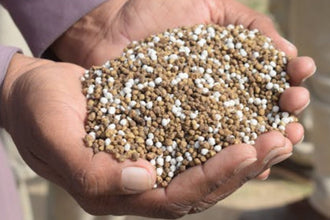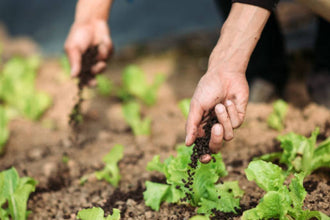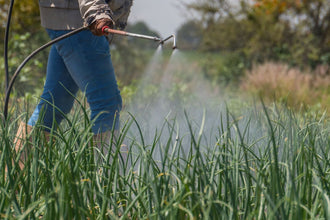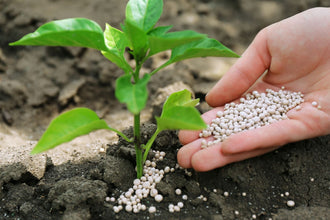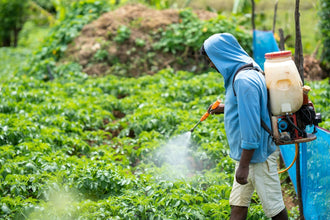Gardening safely with pets is essential. This guide focuses on organic fertilizers and how they impact dogs. Organic fertilizers come from natural sources and help plants and soil. But safety for dogs is sometimes a concern. We'll examine different organic fertilizers, their benefits, and their risks to dogs. The guide also covers how to spot dog fertilizer poisoning and offers tips for safe gardening with pets. Our aim is for gardens and pets to live together safely.
What is Organic Fertilizer?
Organic fertilizer is a natural soil helper. It comes from living things like plants, animals, or minerals. It's a gardener's best friend as it gives soil its natural boost.
Definition and Types
Here is a simple breakdown of organic fertilizer types:
- Animal-based: Fertilizers like manure, bone meal, and fish emulsion belong to this group. They are rich in nutrients for your soil.
- Plant-based: Compost, seaweed, and cottonseed meal are plant-based. They also offer a nutrient boost and make the soil richer.
- Mineral-based: These fertilizers like Epsom salts and green sand give magnesium and potassium to your soil.
Organic vs. Synthetic Fertilizers
Every garden is unique. That's why it's essential to know the differences between organic and synthetic fertilizers:
- Composition: Organic fertilizers are from Mother Nature. They have a wide range of nutrients. Synthetic ones come from a lab and have specific nutrients.
- Release of Nutrients: Organic options give out nutrients slowly over time. This keeps your plants happy for longer. Synthetic ones only offer a quick burst of nutrients.
- Soil Health: Over time, organic fertilizers keep making the soil better. It also help friendly tiny bugs thrive. Synthetic ones can make the soil less healthy if used too often.
Benefits of Using Organic Fertilizers
Using organic fertilizers has a lot of good points for both your garden and our planet:
- Improves Soil Structure: Organic ones make your soil rich. They are also able to hold more water and nutrients.
- Promotes Steady Growth: As nutrients are released your plants will grow at a healthy pace.
- Supports Tiny Life: Organic fertilizers help the small soil bugs for the soil cycle.
- Environmentally Friendly: They are natural, safe for our planet, and prevent pollution.
Organic fertilizers help your garden grow the way nature intended. They not only help your plants grow better but also protect the environment.
What You Need to Know About Safety Concerns for Organic Fertilizers
Regarding gardening and keeping our furry friends safe, it's essential to talk about how organic fertilizers, while great for plants, might not always be the best for our dogs. Let's dive into why safety concerns arise and what common ingredients could be problematic.
Organic Fertilizer Safety Considerations
You might think that it's safe for all because it's organic. However, that's not always the case for our canine companions. Here's a simple overview of why these concerns are worth your attention:
- Natural Doesn't Always Mean Safe: Just because fertilizer is labeled organic doesn't mean it's harmless for pets. Some natural ingredients can be toxic to dogs if ingested.
- Curious Paws and Noses: Dogs are naturally curious creatures who love to sniff and sometimes nibble on things they find in the yard, including fertilizers.
Harmful Ingredients in Organic Fertilizers to Watch Out For
Several common ingredients in organic fertilizers could pose risks to your dog. Here are a few to be mindful of:
- Bone Meal: It sounds safe because it comes from bones, right? However, if dogs eat a lot of it, they can get upset in their stomachs or experience an intestinal blockage.
- Blood Meal: Another ingredient coming from animal products is blood meal. It can be very appealing to dogs. But too much can cause vomiting, diarrhea, or in severe cases, pancreatitis.
- Cocoa Mulch: Made from cocoa shells, it smells great but can be as harmful as chocolate to dogs if ingested.
- Fish Products: Fertilizers from fish might not be as toxic as others. But could still cause stomach upset in dogs.
While organic fertilizers are a good choice, it's essential to consider your pet's safety. Always check the label for these ingredients. Keep your fertilizers stored away, or choose a pet-friendly option. Ensure your furry friends can continue to enjoy your beautiful garden safely.
Recognizing and Responding to Fertilizer Poisoning in Dogs
Your dog's safety can sometimes be at risk even from common things like fertilizers in your garden. Knowing how to spot the signs of fertilizer poisoning is vital for every dog owner. Here's a straightforward guide on the symptoms to look out for and the immediate actions to take if poisoning is suspected.
What to Watch For: Key Signs and Symptoms
If your dog has gotten into some fertilizer, keep an eye out for these warning signs:
- Upset Stomach: This could be a clue if your dog is vomiting or has diarrhea.
- Drooling: More slobber than usual can be a sign of nausea or mouth pain.
- Trouble Breathing: They might be in trouble if they're gasping or panting a lot.
- Looking Weak: Something could be wrong if they are less playful and seem tired.
Immediate Steps to Take if Poisoning is Suspected
Acting fast is critical. Here's what you can do immediately:
- Keep Your Dog Away: First, get your dog away from the fertilizer to prevent them from eating more.
- Check Them Over: Look at their mouth and skin to see if there's any fertilizer left on them.
- Call the Vet: Get on the phone with your vet immediately to tell them what's happening.
- Follow Instructions: Do exactly what the veterinarian suggests. They might tell you to bring your dog in or handle things at home.
If you think fertilizer might poison your dog, it's always better to be safe and talk to your vet.
Gardening with Pets: Safer Alternatives and Precautions
For all the pet-loving gardeners out there. Ensuring your garden is a safe place for your furry friends is crucial. Luckily, there are dog-safe fertilizers. There are natural alternatives that can keep both your garden and pets happy. Here's a list of safe options and some tips on applying fertilizers without putting your pets at risk.
Dog-Safe Fertilizers and Natural Alternatives
Choosing the right fertilizer can make a big difference. Here are some pet-friendly options:
- Compost: Making your compost is a natural and safe way to enrich soil.
- Seaweed: Seaweed-based fertilizers are nutrient-rich and safe around pets.
- Fish Meal or Emulsion: These are generally safe. But ensure they are pure and free from added chemicals.
- Slow-Release Meal Fertilizers: They are less likely to be overconsumed by curious pets.
- Other Pet-Safe Products: Look for fertilizers labeled as safe for pets. Always read the label to be sure.
Tips for Safe Fertilizer Application When Pets Are Around
Even when using safer alternatives, applying them with care is essential. Here are some precautions:
- Read Labels Carefully: Even pet-safe fertilizers can have instructions for safe use. Follow them to the letter.
- Apply and Wait: After applying fertilizer, water your garden well to help the soil absorb it. Then, wait a bit before letting your pets back into the area.
- Store Safely: Keep all your garden chemicals. Even the pet-safe ones, locked away or on high shelves where curious noses can't reach them.
- Wash Paws: If your pet has been in the garden post-fertilizer application. Just wash their paws to remove any residue.
Making your garden a pet-safe zone doesn't have to be daunting. By choosing dog-safe fertilizers and following simple precautions. You can enjoy a beautiful garden without worrying about your furry friend's well-being.
Conclusion
Organic fertilizers, while great for gardens, can pose risks to dogs. It's crucial for pet-owning gardeners to choose products wisely. Among the safer options, Fancy Chicken fertilizer stands out for being both pet-friendly and eco-conscious. It ensures gardeners can pursue their passion without compromising their pets' health or environmental sustainability.
However, adherence to usage instructions and seeking advice from vets or experienced gardeners remains important. By integrating products like Fancy Chicken fertilizer into gardening practices, it becomes possible to cultivate vibrant gardens that are safe for our pets and the planet.




